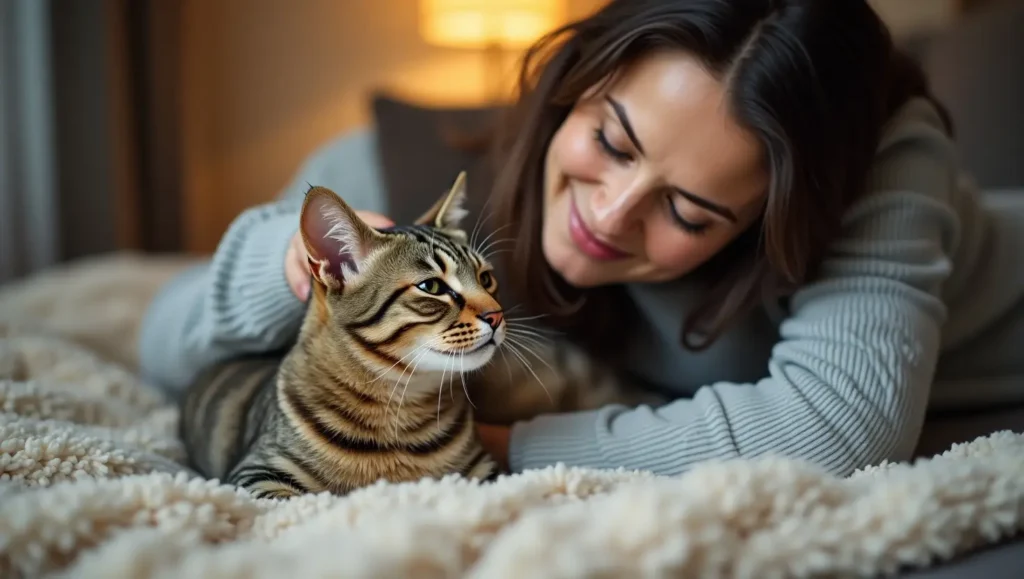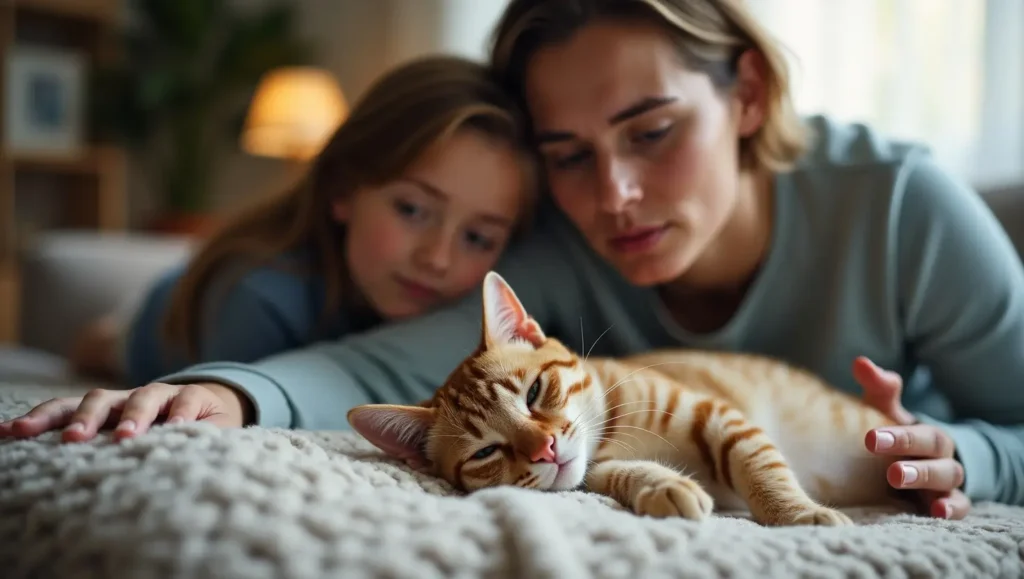Introduction
As a cat owner, it can be worrisome to see your cat breathing heavily.You might find yourself asking, Why is my cat breathing heavily? Whether it happens after playing, during rest, or even while your cat is sleeping, heavy breathing can be a sign of an underlying issue. Understanding why is my cat breathing heavily is crucial to knowing whether it’s a temporary condition or something that requires medical attention. At Whizpet, we know how much you care about your pet’s well-being, and that’s why we’ve put in the effort to research this topic thoroughly.
Our team, composed of experts in pet health, has carefully examined various reasons behind heavy breathing in cats, including physical exertion, stress, and more serious conditions like respiratory or heart issues. By addressing the question why is my cat breathing heavily, we aim to help you identify what might be causing your cat’s symptoms. In this article, we’ll break down the most common causes and provide you with actionable advice to ensure your cat’s health remains in top shape.
Heavy breathing can sometimes be a sign of something as simple as excitement or a full stomach, but other times, it may be more serious. Understanding these symptoms early can help you keep your cat safe and healthy.
What is Normal Cat Breathing?
Before delving into the causes, it’s important to understand what constitutes normal breathing for cats. A resting cat typically takes around 20 to 30 breaths per minute.However, factors such as physical activity, stress, and temperature can temporarily alter your cat’s breathing rate. If your cat’s breathing rate exceeds this range significantly or if it’s accompanied by distressing symptoms, it’s time to investigate further.

Why Is My Cat Breathing Heavily? 5 Common Causes to Know
There are many potential reasons for heavy breathing in cats, ranging from harmless to more serious health conditions. Here are some common causes:
1. Physical Activity or Excitement
One of the most common and least concerning reasons for heavy breathing in cats is physical exertion or excitement. Cats may breathe heavily after playing, running, or exploring. This is usually temporary and should return to normal once they rest and calm down.
What You Can Do:
- Ensure your cat has plenty of time to rest after playtime.
- Avoid overexerting your cat, especially in hot or humid weather.
2. Heat and Humidity
Cats can struggle with breathing when exposed to high temperatures or high humidity. Overheating is particularly common in long-haired breeds like Persians or Maine Coons. Cats might pant and breathe heavily when they become overheated.
What You Can Do:
- Make sure your cat has access to fresh, cool water and a cool place to rest.
- Avoid engaging your cat in physical activity during hot weather or under direct sunlight..
3. Respiratory Infections
Respiratory infections, such as colds or feline pneumonia, can cause heavy breathing. Cats may exhibit other symptoms, including coughing, sneezing, nasal discharge, and lethargy.
What You Can Do:
- Monitor your cat’s behavior closely.
- If you notice coughing, sneezing, or nasal discharge, consult your veterinarian for a proper diagnosis and treatment.
4. Asthma
Feline asthma is a condition where the airways become inflamed and constricted, leading to difficulty breathing. This can cause your cat to pant, cough, and wheeze. It often occurs during or after exertion or exposure to irritants like dust or smoke.
What You Can Do:
- Avoid smoking around your cat, and keep them away from dust and strong odors.
- If you think your cat might have asthma, it’s important to consult a veterinarian. Treatment typically includes medications to reduce inflammation and control the symptoms.
5. Heart Disease
Heart conditions in cats, such as hypertrophic cardiomyopathy, can lead to fluid accumulation in the lungs, making it difficult for your cat to breathe. Heavy breathing, especially when accompanied by lethargy and loss of appetite, may indicate a heart issue.
What You Can Do:
- If your cat’s breathing is accompanied by lethargy, difficulty walking, or loss of appetite, contact your veterinarian immediately.
- Heart disease in cats is treatable with medication, but early detection is key.
6. Anemia
Anemia occurs when a cat has a low red blood cell count, leading to poor oxygen delivery to tissues. This can make a cat breathe heavily as their body tries to compensate for the lack of oxygen.
What You Can Do:
- If your cat seems lethargic or weak in addition to heavy breathing, schedule an appointment with your vet.
- Blood tests will help diagnose anemia, and treatment often includes addressing the underlying cause.
7. Obesity
Obesity is a growing concern among cats, and it can lead to various health issues, including heavy breathing. Overweight cats are at a higher risk of developing respiratory problems and may experience difficulty breathing while at rest or during mild exertion.
What You Can Do:
- Keep an eye on your cat’s weight and provide a well-balanced diet.
- Encourage regular, light activity to help maintain a healthy weight.
8. Trauma or Injury
Injuries such as broken ribs, a punctured lung, or other trauma can lead to rapid, labored breathing. If your cat has recently been in an accident or has suffered a fall, their heavy breathing could be a sign of injury.
What You Can Do:
- If you suspect your cat has been injured, seek emergency veterinary care immediately.
- Keep your cat calm and still until they receive medical attention.
9. Fluid Buildup (Pleural Effusion)
Sometimes, fluid can accumulate in the chest cavity, making it difficult for your cat to breathe. This can occur as a result of heart disease, cancer, or other serious conditions.
What You Can Do:
- If your cat’s breathing is accompanied by weakness or a bloated abdomen, consult your vet immediately.
- Your vet will perform diagnostic tests to determine the cause and recommend the appropriate treatment.
When Should You Worry About Heavy Breathing?
While occasional heavy breathing due to physical activity or excitement is normal, there are certain signs that require immediate attention:
- Labored or fast breathing at rest
- Panting (especially if it’s not due to heat)
- Coughing, sneezing, or wheezing
- Lethargy, loss of appetite, or weakness
- Blue or pale gums
- Persistent heavy breathing that lasts for more than a few minutes
If your cat exhibits any of these signs, it’s important to seek veterinary care as soon as possible. Postponing treatment may exacerbate the underlying condition.
Precautionary Tips to Keep Your Cat Safe
- Regular Vet Check-ups: Ensure your cat has annual or bi-annual check-ups to catch any potential health problems early.
- Maintain a Healthy Weight: Obesity can contribute to breathing issues, so keep your cat’s weight in check with a proper diet and regular activity.
- Environmental Considerations: Keep your home free from smoking, strong odors, and excessive dust, which can aggravate respiratory issues.
- Stay Cool in Hot Weather: Keep your cat in a cool, shaded area during the summer to prevent overheating.
- Proper Hydration: Always ensure your cat has access to fresh water to stay hydrated.

What to Do If You’re Concerned About Your Cat’s Breathing?
If you notice any of the following, it’s crucial to seek professional help as soon as possible:
- Rapid or labored breathing: Persistent or sudden heavy breathing can be a sign of a severe health condition.
- Lethargy or changes in behavior: If your cat is unusually tired or inactive, it could indicate a deeper issue.
- Loss of appetite: If your cat is breathing heavily and not eating, they could be suffering from an underlying illness.
Take your cat to the veterinarian immediately if you notice any of these symptoms. Early diagnosis and treatment are key to ensuring your cat’s health.
How Can I Help My Cat Breathe More Easily?
To help your cat breathe more easily, ensure they have a calm, cool, and comfortable environment. Some tips include:
- Keep your cat cozy: During warm weather, offer air conditioning or fans to ensure your cat stays cool and comfortable.
- Reduce stress: Keep loud noises, unfamiliar visitors, or other stressors to a minimum.
- Maintain a healthy weight: Follow your vet’s advice on weight management if your cat is overweight.
Conclusion
Understanding Why Is My Cat Breathing Heavily is essential for determining whether it’s a normal response to activity or a sign of a more serious health issue. Whether it’s due to physical exertion, stress, respiratory infection, heart disease, or obesity, recognizing the symptoms early can help you take appropriate action to safeguard your cat’s health.
Always trust your instincts as a pet owner. If you ever feel concerned about your cat’s breathing, consult your veterinarian for a thorough evaluation. Your furry friend relies on you for care, and the sooner any potential issues are addressed, the better the chances for a full recovery.
FAQs
1. Why is my cat breathing heavily through the nose?
Breathing heavily through the nose can indicate a respiratory infection, nasal congestion, or in some cases, heart issues. It’s crucial to consult a veterinarian for a precise diagnosis.
2.Why is my cat breathing fast while sleeping?
Heavy breathing while sleeping could be a sign of obesity, respiratory problems, or even stress. Monitor the breathing rate and check for any other symptoms like lethargy or coughing.
3. What should I do if my cat is breathing heavily and seems lethargic?
If your cat shows signs of lethargy along with heavy breathing, it could indicate a serious condition, such as heart disease or a respiratory issue. Immediate veterinary attention is needed.
4. Can my cat’s heavy breathing be a sign of heatstroke?
Yes, heatstroke can cause heavy breathing in cats. Ensure your cat has access to cool, shaded areas, and seek veterinary help if you suspect heatstroke.
5. How can I determine if my cat’s breathing is normal?
A typical cat’s breathing is slow and steady, usually ranging from 20 to 30 breaths per minute when they are resting.If your cat’s breathing is fast, labored, or accompanied by distress, consult your veterinarian.
Call to Action (CTA)
If you’re concerned about your cat’s health or have noticed any changes in their breathing, don’t wait! Schedule an appointment with your veterinarian today and ensure your furry friend gets the care they deserve.
Related blog: For more detailed information about pet care


Pingback: Can I Rehome Foster to Adopt Cat? 3 Gentle, Powerful Steps